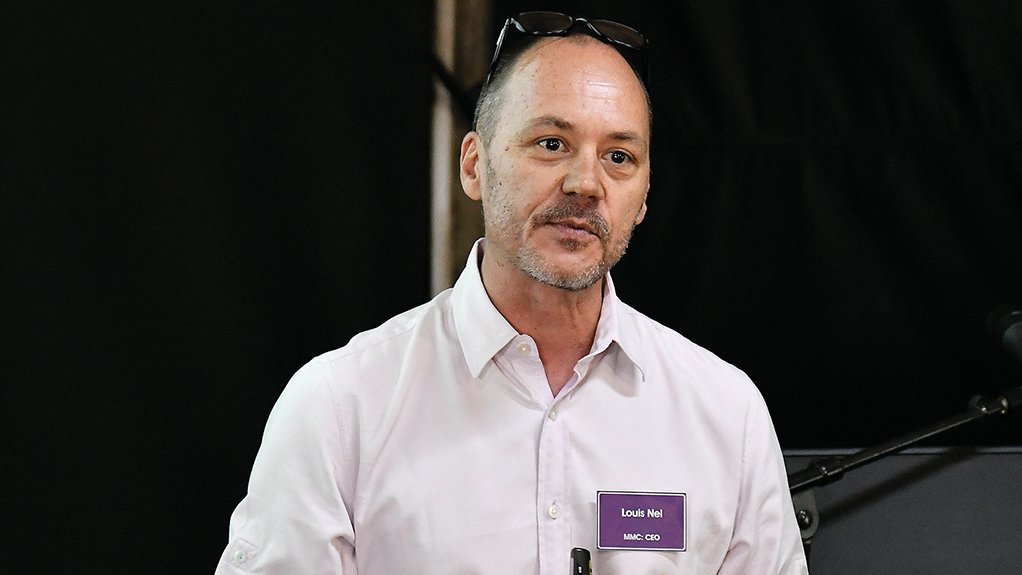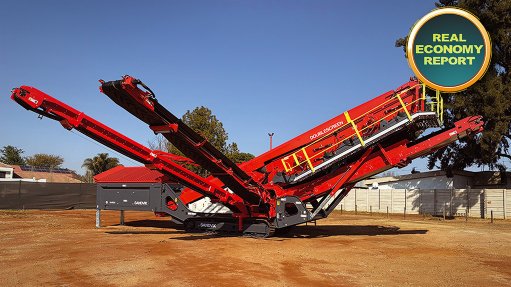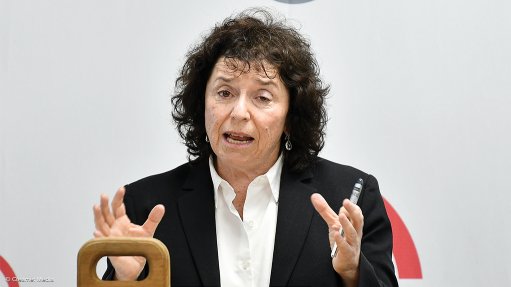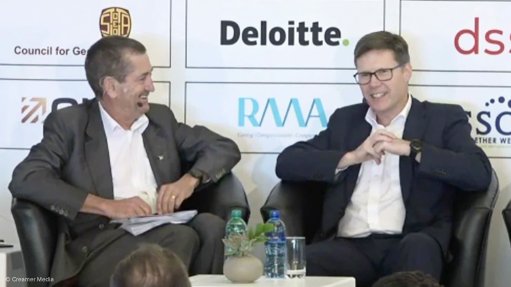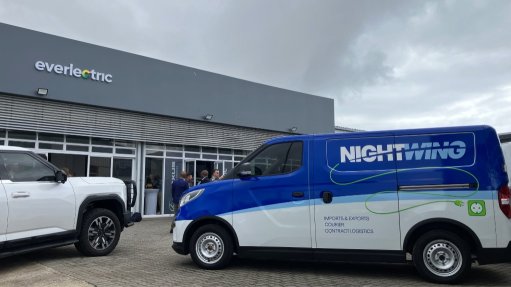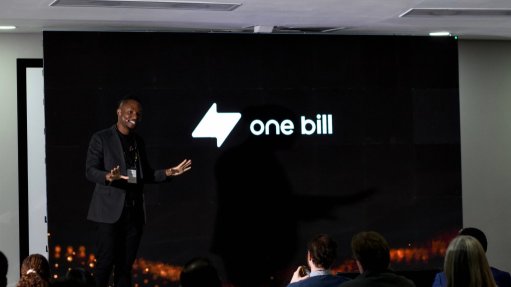South Africa must grow its manganese processing capabilities to capitalise on resources
South Africa mines less than 2% of global manganese and the mineral is abundant, but processed and beneficiated manganese products are critical and in demand, especially as most of the world's manganese processing is done in China, local processing company Manganese Mining Company (MMC) CEO Louis Nel has highlighted.
MMC produced about 80 000 t/y of high-grade electrolytic manganese metal (EMM), he said during the Joburg Indaba 'Manganese – SA’s critical mineral' panel discussion on October 3.
"We may want to think of manganese as a critical mineral, but it is not. The supply is sufficient for demand. Its use in high-end electric vehicle batteries is part of its future prospects, but, with the projects that have been announced, there will be excess capacity and it will also take some time before the core use in steelmaking is overtaken by high-end needs," said management consulting firm McKinsey & Company senior partner Zak Gaibi.
"South Africa is blessed with some of the highest-grade manganese in the world, which is fortunate, but a lot of the value is in processing these resources. About 60% to 65% of the costs currently are in the broader supply chain and logistics. We need to compress these costs to be competitive with China," he stressed.
With geopolitical shifts, there was an opportunity for South Africa to explore how to progress the local beneficiation of manganese, said Nel.
MMC was the only producer of high-grade EMM based outside China. MMC has been processing manganese for 50 years and has been running at maximum capacity for several years.
The company was currently looking at producing high-grade manganese sulphate from locally mined manganese, first from the metal and then directly from the ore. This project was funded and should break ground in 2025 and start producing in 2026, he added.
"South Africa can capably mine manganese, but does not have sufficient chemical skills to move from mining to producing sulphate and battery minerals. It is therefore critical for South Africa to partner with international companies that know how to process the mineral as part of the next phase for manganese," said State-owned energy mining company African Exploration Mining Finance Corporation (AEMFC) CEO Lemogang Pitsoe.
"While manganese is not a critical mineral, we need to develop a policy for strategic and critical minerals. The world is not waiting for us [to develop a policy]. We need a clear policy for developing strategic minerals," he added.
As a country, South Africa needed to look at manganese differently, specifically how it could play a role further down the value chain, as well as how it could put a supply chain in place that would enable the country to play a role in the value chain, said diversified mining company African Rainbow Minerals (ARM) new business development executive Sihle Mdluli.
Further, the downstream supply chain of manganese differs from that of manganese ores because it is affected by geopolitical issues, including decarbonisation and climate change.
"We must think carefully about where we want to be in the value chain and what is present that can support this," she said.
The sector should collaborate, including with government, to solve some of the issues impeding exports, including logistics and ports.
On the electricity side, the ferromanganese and ferroalloys industry has suffered significantly.
"We need concerted efforts, including from government, to look at how we can revive the ferroalloys sector in the country. [ARM has] developed a technology for producing ferromanganese and ferrochrome cheaply using less electricity, and we hope this will help to revive the industry," she said.
Fortunately, there were several models from countries around the world that South Africa could look to replicate for its manganese resources, said Nel.
"Indonesia is dominant in nickel refining at the moment owing to the approach its government took, while China's strategy resulted in it securing 90% of all manganese beneficiation within its borders."
However, only mining and shipping the ore is not a model that will work, said Mdluli.
"ARM has invested in direct smelting technology. It has been ten years in the making, through demonstrations and piloting. We are now at the point where we are ready to commercialise it," she said.
In terms of research and development, the challenge was that not all technologies would develop into viable products or solutions. However, companies must be willing to invest and "kiss several frogs before finding the prince".
"Technology will play a critical role in the supply and value chains. We realised that our processing capabilities are not enough to progress our strategy and we partnered with [manganese battery products company] Innovative Manganese Technologies South Africa," she added.
Manganese refining technology was centralised in China and South Africa. A key challenge for MMC was that electricity cost comprised 40% of its overall costs, which had risen from 18% of its costs one decade ago, said Nel.
"This is a significant cost increase. We are essentially using electricity to convert ore into product. However, South Africa does still have the ability to innovate to develop its processing capabilities.
"We have a specialised team of chemical engineers and a consistent pipeline of young talent. We partnered with the University of Limpopo and we are confident that we have the tools and the young people to assist us in building our new plants," he said.
Comments
Press Office
Announcements
What's On
Subscribe to improve your user experience...
Option 1 (equivalent of R125 a month):
Receive a weekly copy of Creamer Media's Engineering News & Mining Weekly magazine
(print copy for those in South Africa and e-magazine for those outside of South Africa)
Receive daily email newsletters
Access to full search results
Access archive of magazine back copies
Access to Projects in Progress
Access to ONE Research Report of your choice in PDF format
Option 2 (equivalent of R375 a month):
All benefits from Option 1
PLUS
Access to Creamer Media's Research Channel Africa for ALL Research Reports, in PDF format, on various industrial and mining sectors
including Electricity; Water; Energy Transition; Hydrogen; Roads, Rail and Ports; Coal; Gold; Platinum; Battery Metals; etc.
Already a subscriber?
Forgotten your password?
Receive weekly copy of Creamer Media's Engineering News & Mining Weekly magazine (print copy for those in South Africa and e-magazine for those outside of South Africa)
➕
Recieve daily email newsletters
➕
Access to full search results
➕
Access archive of magazine back copies
➕
Access to Projects in Progress
➕
Access to ONE Research Report of your choice in PDF format
RESEARCH CHANNEL AFRICA
R4500 (equivalent of R375 a month)
SUBSCRIBEAll benefits from Option 1
➕
Access to Creamer Media's Research Channel Africa for ALL Research Reports on various industrial and mining sectors, in PDF format, including on:
Electricity
➕
Water
➕
Energy Transition
➕
Hydrogen
➕
Roads, Rail and Ports
➕
Coal
➕
Gold
➕
Platinum
➕
Battery Metals
➕
etc.
Receive all benefits from Option 1 or Option 2 delivered to numerous people at your company
➕
Multiple User names and Passwords for simultaneous log-ins
➕
Intranet integration access to all in your organisation



